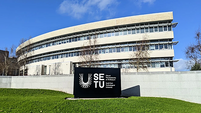Teen died after suffering bleeding in her brain following fall during epileptic seizure, inquest hears

Seán McCárthaigh
A young Laois teenager, who had an undiagnosed rare genetic disorder, suffered fatal bleeding in her brain following a fall during an epileptic seizure at her home, an inquest has heard.
Sandra Kuzmecka (13) from Glenkeen Park, Fairgreen, Portlaoise, Co Laois, died at Children’s Health Ireland at Temple Street in Dublin on August 26th, 2023 – two days after she had suffered a seizure as she was getting dressed in her bedroom.
An inquest into the girl’s death at Dublin District Coroner’s Court on Monday heard that she was diagnosed with a previously unknown rare genetic disorder – KBG Syndrome – while tests were being conducted to establish the cause of the bleeding.
Although the coroner, Clare Keane, noted that the condition is associated with epilepsy, developmental delay and learning disability, the inquest heard medical evidence that there is no known link between KBG Syndrome and bleeding in the brain.
Sandra’s mother Dorota Kuzmecka told the hearing that her daughter, who was a pupil at St Francis Special School in Portlaoise, had epilepsy and autism.
Ms Kuzmecka gave evidence of hearing her daughter falling in her upstairs bedroom at their home on the morning of August 24th, 2023.
When she went up to check, Ms Kuzmecka described finding Sandra lying on the ground at the top of the stairs and having a seizure.
An ambulance was called after the teenager suffered a number of seizures in short succession, and she was transported to the Midlands Regional Hospital in Portlaoise before being transferred later the same day to Temple Street.
The inquest heard that Sandra had suffered a panic attack and fell while they were at a shopping centre in Dublin two days earlier “but she was OK after a while.”
In reply to questions from the coroner, Ms Kuzmecka said it was common for her daughter to fall to the ground when having seizures, which could occur around 2-3 times per week.
The inquest heard that Sandra was on medication to treat her epilepsy and was regularly seen by doctors to check on her condition.
A consultant paediatrician at the MRH in Portlaoise, Farkhanda Mohammad, said the patient had vomited twice in the emergency department.
Although her seizures stopped for about 25 minutes in the hospital, Dr Mohammad said she was intubated and ventilated after the seizures restarted so that she was stable for the transfer to Temple Street.
The inquest heard that doctors treating the teenager were puzzled as to the cause of the bleeding in her skull, as there were no external visible signs that she had suffered any head injury.
A comprehensive series of tests had also ruled out any pre-existing conditions or that some infection or a blood clot was responsible for the subdural brain haemorrhage.
A consultant paediatric pathologist, John O’Neill, gave evidence of finding some small bruising above the girl’s skull bone during a postmortem.
Dr O’Neill said the cause of the bleeding was not established by the postmortem, even though some kind of head trauma was the most common explanation for it with children, but there was no evidence it was an old injury.
In the absence of any other explanation, the pathologist said he believed that some recent trauma was the likely cause of the bleeding to the teenager’s brain.
However, Dr O’Neill admitted that it was unusual for such extensive damage to arise from what appeared to be a minor injury.
He confirmed that there was no known link between KBG Syndrome and bleeding in the brain.
A consultant paediatric neurologist, Bryan Lynch, who had treated the deceased since June 2018, said there had been a number of changes to her medication over time in order to try and control her epilepsy.
Prof Lynch said her seizures had reduced to around one per week when she was last seen by a doctor in July 2023.
The consultant said a CT scan on the patient on her arrival at Temple Street showed extensive subdural haemorrhaging on the left side of her brain.
He said further extensive tests on the teenager could not establish any underlying cause for the bleeding.
Prof Lynch said it would be unusual for bleeding of the brain to be caused directly by a seizure, and he had never seen such a case.
However, he acknowledged that it could arise as a result of a fall from a seizure.
Prof Lynch said genetic testing had shown that Sandra had a mutation associated with KBG Syndrome, although she did not have some of the typical features linked to the condition.
He said it was a new mutation and neither of the teenager’s parents had it.
The consultant said Sandra was likely to have had ongoing learning disability and epilepsy as a result of being diagnosed with KBG Syndrome as it was a condition that did not change over life.
Ms Kuzmecka wiped back tears as she heard Prof Lynch say it was clear to him that the girl had been lovingly cared for by her family throughout her life.
Recording a narrative verdict, Dr Keane found the cause of the teenager’s death was acute intracranial bleeding due to a fall as a result of an epileptic seizure against a background of KBG Syndrome.
The coroner noted that the deceased had ongoing issues with controlling her epilepsy and had suffered an unwitnessed fall at home two days before her death.
Offering her condolences to Sandra’s relatives, Dr Keane said her death was “unpredictable and unexpected.”





